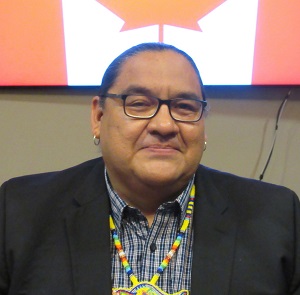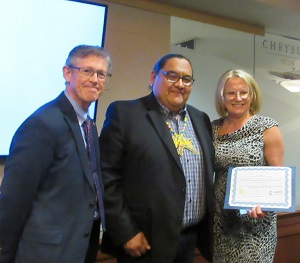 Our Speaker, Stephen Buffalo  Catherine Brownlee Thanks Our Speaker |
| Steve Allan introduced Stephen Buffalo, President & CEO of the Indian Resource Council. The IRC was created in 1987 by Chiefs representing the oil and gas producing First Nations to support their efforts in attaining greater management and control of their oil and natural gas resources, and in bringing together 134 Canadian First Nations to advocate for responsible First Nations energy development. The IRC's activities are governed by the following mandates.
|
Mr. Buffalo stressed that the 643 First Nations in Canada encompass a diverse array of perspectives, values and interests, despite the impression held by many Canadians of a single First Nations consensus. As an example of this, he mentioned the often overlooked fact that 30 of 42 First Nations along the route of the Northern Gateway pipeline had signed agreements with the project's proponent.
Reinforcing the message delivered by Vivian Krause at our April 9th meeting, Mr. Buffalo described how the Federal Court of Appeal ruling that led to the initial approval of the Trans Mountain pipeline expansion being overturned was litigated by a small number of First Nations who were funded by foreign environmental NGOs. He delivered the message that Canada's First Nations do not need foreign environmentalists to speak for them.
He spoke of how First Nations are slowly gaining their autonomy and are moving past the Indian Act, which has held First Nations back for generations. Many First Nations, including the 134 who are current members of the IRC, view responsible resource development as being essential to their being lifted out of poverty.
No longer content to being passive participants in resource projects on their lands, these First Nations need to have significant ownership stakes in the projects that affect their lives, and a number of exciting First Nations projects are taking shape.
- Project Reconciliation (www.reconciliationpipeline.ca) is putting together a consortium of First Nations from Saskatchewan, Alberta and British Columbia to purchase a fifty-one per cent ownership stake in the Trans Mountain Pipeline expansion.
- The Eagle Spirit Pipeline is a First Nations led initiative from Alberta to Prince Rupert that loosely parallels the route proposed for Northern Gateway.
Additionally, the IRC is working to defeat two ill-considered pieces of legislation that are currently before the Parliament of Canada. The IRC believes that by crippling the energy industry, Bills C-48 and C-69 threaten the continued ability of First Nations to improve the well-being, health and prosperity of their people.
Many Indigenous people want a strong resource industry to invest in, and want to benefit from development as employees, as partners and as owners. They are not opposed to development; but can no longer be bystanders to it.
Following a lively question and answer session, Catherine Brownlee thanked our speaker.
